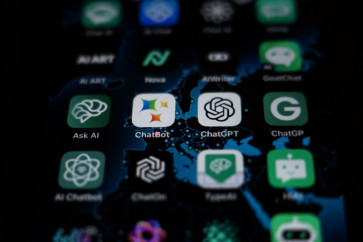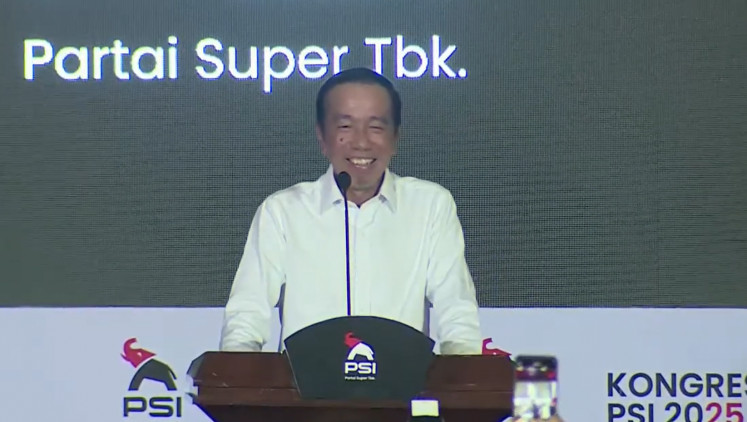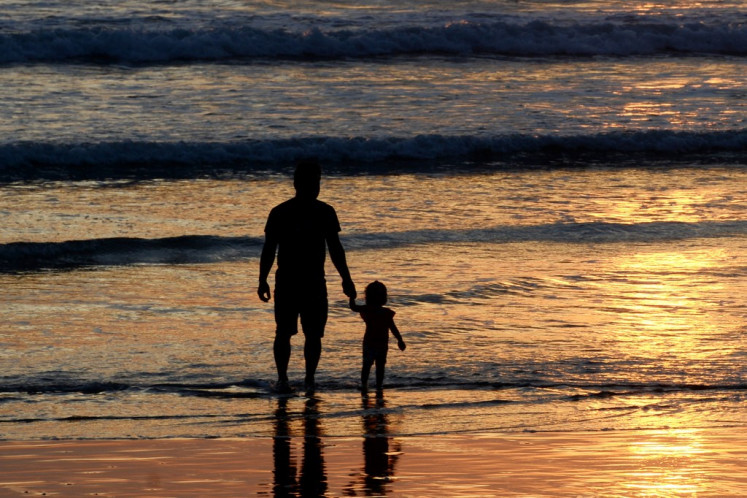Popular Reads
Top Results
Can't find what you're looking for?
View all search resultsPopular Reads
Top Results
Can't find what you're looking for?
View all search resultsFacebook to fight fake news in Indonesia
Samuel Abrijani Pangerapan (Kominfo
Change text size
Gift Premium Articles
to Anyone
Samuel Abrijani Pangerapan (Kominfo.go.id)
With hoax reports being seen as playing a crucial role in swaying political opinions in Indonesia, millions of whose citizens are avid social media users, the government has continued to push social media sites to take part in the nation’s war against fake news online.
On Wednesday, the Communications and Information Ministry held a meeting with Jeff Wu, Facebook’s head of trust and safety for the Asia Pacific region, and Alvin Tan, the site’s head of public policy Southeast Asia. The meeting was aimed at getting the social media giant to join the government’s efforts to combat hoaxes on social media, which have become a serious concern in the country.
During the meeting, the Facebook officials told the ministry they would write an algorithm to more quickly tackle the circulation of hoax reports, Samuel Abrijani Pangerapan, the ministry’s director general for information applications, told reporters in a press briefing after the meeting.
Samuel did not elaborate on how the algorithm would work in identifying hoaxes, but he said it would complement the existing flagging system where fake news is identified and blocked based on user reports.
Facebook did not reply to The Jakarta Post’s email asking about the details of the new measures to tackle fake news.
Samuel said there were technical issues that needed to be addressed on the ground, given that blocking hoaxes required the intervention of humans who would judge whether or not content constituted a hoax report.
To achieve that, the government and Facebook will form an “integrated team” consisting of individuals from both parties who will be in charge of determining whether or not an article is a hoax. The team is expected to be established before the 2019 presidential election, Samuel said.
To show their seriousness in cooperating with the Indonesian government in tackling various issues in the country, including the spread of hoaxes, Facebook also said it would establish an office in Indonesia. The office will be fully operational before the celebration of Indonesia’s Independence Day on August 17, Samuel said.
“The office will be used for tax purposes, customer service and all the things related to the company’s operation in Indonesia,” Samuel added.
The government has regarded Facebook as being tardy in the past in its response to its requests, including requests to block “negative content” such as hoaxes and content containing radical materials spread by terrorists groups.
Samuel said that unlike other social media companies whose rate of response, also called service level index (SLI), reached up to 79 percent, Facebook’s response rate stood at around 40 percent.
Samuel said the opening of Facebook’s office in the country was expected to increase the company’s rate of response to the government.
Facebook has also established a team in Indonesia specifically assigned to monitor hoaxes in the country, Samuel said.
The social media company has so far relied on users’ reports in identifying hoaxes as a result of technical issues in resolving such issues; the main one being that identifying hoaxes required human judgement.
Facebook has faced challenges in combating hoax posts in many countries.
The company, for example, came under fire during the United States presidential election last November given the proliferation of hoax pieces on its platform. It had been accused of contributing to the victory of Donald Trump in the election because of the hoaxes, a claim founder Marc Zuckerberg has denied, saying that the hoaxes did not influence the election as they had come from both sides.
In Indonesia, the government has pushed all social media companies, including Facebook, to clear their platforms of fake news. The government has begun campaigns to combat hoaxes after the recent Jakarta gubernatorial election was marred by a huge number of hoax reports on social media, as part of a rise in sectarian sentiments.
“An algorithm works based on a ‘yes’ or ‘no’ mechanism. It is impossible to tackle hoaxes using only technology. It needs humans to check and judge content,” Heru Sutadi, executive director of the Indonesian Information and Communication Technology Institute told the Post. “Simply using technology is a lazy way to combat hoaxes,” he added.
Heru further recommended that Facebook and other social media companies collaborate with organizations that specifically monitor social media activities to make identification easier and faster. “It is not enough to rely on a team from Facebook.”










